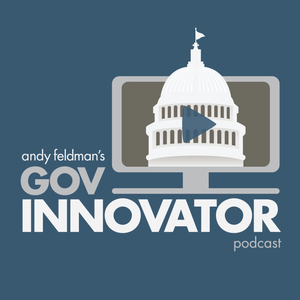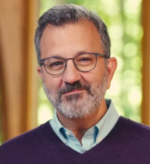
Gov Innovator Podcast
Andy Feldman
The Gov Innovator podcast, hosted by Dr. Andy Feldman, features concise ten-minute interviews with insightful public sector innovators and experts. Its goal is to share useful practices and insights with public leaders related to evidence-based policy, da
- 11 minutes 48 secondsHow results-driven contracting improved outcomes for Chicago’s most vulnerable: An interview with Lisa Morrison Butler, former Commissioner, Chicago Department of Family and Support Services – Episode #202
 Too often, contracting is seen as a back-office function, even though many government programs are actually implemented with contracted service providers. In reality, contracting — and contracting reforms — can be a key driver of better results in human services, including for the most vulnerable families and individuals.
Too often, contracting is seen as a back-office function, even though many government programs are actually implemented with contracted service providers. In reality, contracting — and contracting reforms — can be a key driver of better results in human services, including for the most vulnerable families and individuals.We discuss specific steps in results-driven contracting with Lisa Morrison Butler, the former Commissioner of the Chicago Department of Family and Support Services (DFSS) and now the Executive Vice President and Chief Impact Officer at Results for America. She served as Commissioner of DFSS — the largest funder of human and social services in the city — for more than five years across two mayoral administrations. Under her leadership, she led an organizational transformation aimed at achieving greater overall impact, including overhauling the department’s approach to contracting.
The five main steps in DFSS’s path to results-driven contracting that we discuss are:
- Build consensus around the need for change related to contracting.
- Choose a pilot division.
- Develop a calendar to roll out reform across the department.
- Build clear goals and new expectations into each new RFP, among participating divisions.
- Adopt active contract management, including developing learning cohorts that met quarterly.
Learn more:
- To hear other Gov Innovator podcast interviews on results-driven contracting, click this link.
- Read Lisa’s “Innovator Interview” with the Harvard Kennedy School’s Government Performance Lab on her efforts to improve outcomes at Chicago’s DFSS.
The post How results-driven contracting improved outcomes for Chicago’s most vulnerable: An interview with Lisa Morrison Butler, former Commissioner, Chicago Department of Family and Support Services – Episode #202 appeared first on Gov Innovator Podcast.
18 December 2022, 2:00 pm - 12 minutes 55 secondsUsing mindfulness practices for greater self-awareness and self-improvement: Rabbi Marc Margolius, Senior Program Director, Institute for Jewish Spirituality – Episode #201
 When we think about what skills leaders need to be successful — such as making good decisions, regulating their emotions and stress, and forming strong and healthy relationships with others — an important foundation for those skills is mindfulness. Our guest today has deep expertise in helping people cultivate self-awareness and mindfulness in order to (to paraphrase his own words) help them become the person they’re meant to be in the world, hopefully growing towards that day by day. Rabbi Marc Margolius is the Senior Program Director at the Institute for Jewish Spirituality. He hosts IJS’s daily mindfulness meditation sessions and teaches an online program called “Awareness in Action” designed to cultivate character through mindfulness.
When we think about what skills leaders need to be successful — such as making good decisions, regulating their emotions and stress, and forming strong and healthy relationships with others — an important foundation for those skills is mindfulness. Our guest today has deep expertise in helping people cultivate self-awareness and mindfulness in order to (to paraphrase his own words) help them become the person they’re meant to be in the world, hopefully growing towards that day by day. Rabbi Marc Margolius is the Senior Program Director at the Institute for Jewish Spirituality. He hosts IJS’s daily mindfulness meditation sessions and teaches an online program called “Awareness in Action” designed to cultivate character through mindfulness.Rabbi Margolius presents the three step process used by IJS:
- First, adopt a stance of non-judgmental curiosity by observing one’s own mind and reactions. This can be done by simply pausing.
- Next, be aware of having the possibility of choice, realizing that we have a range of options in responding to a stimulus.
- And finally, choose the value or set of values that one wants to use in responding.
Together, these steps can help us to have a response rather than a reaction. The approach draws at times from Jewish spiritual practice, but it can be useful for anyone, whatever one’s faith background or connection (or not) to a religion.
A transcript of our conversation is available here.
Related resources: An article co-authored by Andy Feldman and Rabbi Margolius in Government Executive on the value of mindfulness practices is here. The magazine also interviewed the co-authors for their podcast, available here.
The post Using mindfulness practices for greater self-awareness and self-improvement: Rabbi Marc Margolius, Senior Program Director, Institute for Jewish Spirituality – Episode #201 appeared first on Gov Innovator Podcast.
28 April 2022, 11:03 am - 16 minutes 11 secondsCareer reflections from an evidence leader: An interview with Naomi Goldstein, Administration for Children and Families, U.S. Department of Health and Human Services – Episode #200
 To celebrate our 200th interview, we are joined by one of the most respected people within the evidence and evaluation field, Dr. Naomi Goldstein, to share reflections on her 21-year career at the Administration for Children and Families (ACF) at the U.S. Department of Human Services.
To celebrate our 200th interview, we are joined by one of the most respected people within the evidence and evaluation field, Dr. Naomi Goldstein, to share reflections on her 21-year career at the Administration for Children and Families (ACF) at the U.S. Department of Human Services.Dr. Goldstein (@NaomiGoldstein1) is the Deputy Assistant Secretary for Planning, Research, and Evaluation at ACF. She will retire from federal service this week after a 21-year tenure at ACF, including becoming Director of the Office of Planning, Research and Evaluation (OPRE) in 2004 and Deputy Assistant Secretary in 2015. Beyond those important career achievements, it is her kindness, humility, candor and commitment — and, I would add, all with a sense of humor — that have made her such a valued colleagued and friend to so many over the years.
A transcript of our conversation is available here.
Learn more:
- Recent OPRE blog post by Dr. Goldstein: “How Do I Love My Job? Let Me Count the Ways“
- Previous podcast interviews:
The post Career reflections from an evidence leader: An interview with Naomi Goldstein, Administration for Children and Families, U.S. Department of Health and Human Services – Episode #200 appeared first on Gov Innovator Podcast.
31 March 2022, 7:05 am - 10 minutes 40 secondsColorado’s nation-leading practices in using evidence to guide budget decisions: An interview with Sara Dube, Director, Results First Initiative, The Pew Charitable Trusts – Episode #199
 Colorado is a leader in the U.S. in terms of using evidence to guide state budget decisions, so that dollars flow to programs that are effective. It’s also a leader in terms of building evidence to better learn what works in key program areas. For example:
Colorado is a leader in the U.S. in terms of using evidence to guide state budget decisions, so that dollars flow to programs that are effective. It’s also a leader in terms of building evidence to better learn what works in key program areas. For example:- State agencies are required by the governor’s budget office to show the evidence behind requested budget changes.
- In doing that, agencies use a framework called the “Evidence Continuum” that describes the stages of building and assessing program information.
- Also, the legislature now requires agencies to use consistent definitions of evidence-based programs in their budget requests.
- And Colorado is one of only a handful of states to have a dedicated fund to support program evaluations.
A recent report by the The Pew Charitable Trusts’ Results First initiative, titled “Colorado’s ‘Evidence Continuum’ Promotes Efficient, Effective Public Programs,” discusses the state’s progress in these areas. To get an overview, we are joined by one of its authors, Sara Dube who directs the Results First initiative at the The Pew Charitable Trusts.
The post Colorado’s nation-leading practices in using evidence to guide budget decisions: An interview with Sara Dube, Director, Results First Initiative, The Pew Charitable Trusts – Episode #199 appeared first on Gov Innovator Podcast.
17 March 2022, 6:40 am - 11 minutes 36 secondsHow state tuition-free college programs are spanning political divides: An interview with Michelle Miller-Adams, Senior Researcher, Upjohn Institute – Episode #198
 An important area of innovation within higher-education policy in recent years has been tuition-free college policies — also known as Promise Programs — designed to make college more affordable and accessible. Our previous podcast interview with Professor Elizabeth Bell of Florida State University provided an overview of the topic. In this new interview, we focus further on state-level programs, including the fact that Promise Programs have spread to states of very different political leanings.
An important area of innovation within higher-education policy in recent years has been tuition-free college policies — also known as Promise Programs — designed to make college more affordable and accessible. Our previous podcast interview with Professor Elizabeth Bell of Florida State University provided an overview of the topic. In this new interview, we focus further on state-level programs, including the fact that Promise Programs have spread to states of very different political leanings.To do that, we are joined by Dr. Michelle Miller-Adams (@mmilleradams). She is the co-director of the Upjohn Institute’s place-based research initiative and is a national expert on tuition-free college initiatives. Her latest book is The Path to Free College: In Pursuit of Access, Equity, and Prosperity.
The post How state tuition-free college programs are spanning political divides: An interview with Michelle Miller-Adams, Senior Researcher, Upjohn Institute – Episode #198 appeared first on Gov Innovator Podcast.
8 March 2022, 5:17 am - 10 minutes 59 secondsHow Promise Programs are expanding college access, affordability, and degree attainment: An interview with Elizabeth Bell, Florida State University – Episode #197
 Tuition-free college policies have become a cornerstone of policymakers’ efforts to expand college access, affordability, and degree attainment. The movement began at the local level with initiatives such as the Kalamazoo Promise, but has since been taken to the state level, with 21 states currently operating Promise Programs.
Tuition-free college policies have become a cornerstone of policymakers’ efforts to expand college access, affordability, and degree attainment. The movement began at the local level with initiatives such as the Kalamazoo Promise, but has since been taken to the state level, with 21 states currently operating Promise Programs.To learn more about these important policies and the evidence behind them, we are joined by someone who has examined them closely, Dr. Elizabeth Bell (@PoliSciBell). She is an Assistant Professor at the Askew School of Public Administration and Policy at Florida State University and also serves as an Academic Affiliate for the Office of Evaluation Sciences within the federal government.
The post How Promise Programs are expanding college access, affordability, and degree attainment: An interview with Elizabeth Bell, Florida State University – Episode #197 appeared first on Gov Innovator Podcast.
1 March 2022, 6:05 am - 10 minutes 21 secondsInsights about building credible evidence in social policy: An interview with David Anderson, Vice President of Evidence-Based Policy, Arnold Ventures – Episode #196
 Arnold Ventures launched its evidence-based policy initiative in 2015 in large part to increase the number of social programs with strong evidence behind them. To do that, the team funds randomized controlled trials of programs in social policy whose prior evidence has shown the potential for sizable effects on educational achievement, earnings, and other important outcomes. To date it has funded over 100 RCTs — shown here — and disseminates findings from Arnold Ventures-funded RCTs as they become available. Programs backed by especially promising evidence, whether funded through Arnold Ventures or not, are highlighted on its Social Programs that Work website; discussions on research reporting and transparency are highlighted on its Straight Talk on Evidence (@NoSpinEvidence) website.
Arnold Ventures launched its evidence-based policy initiative in 2015 in large part to increase the number of social programs with strong evidence behind them. To do that, the team funds randomized controlled trials of programs in social policy whose prior evidence has shown the potential for sizable effects on educational achievement, earnings, and other important outcomes. To date it has funded over 100 RCTs — shown here — and disseminates findings from Arnold Ventures-funded RCTs as they become available. Programs backed by especially promising evidence, whether funded through Arnold Ventures or not, are highlighted on its Social Programs that Work website; discussions on research reporting and transparency are highlighted on its Straight Talk on Evidence (@NoSpinEvidence) website.To hear lessons from that work and also broader observations from someone working to advance evidence-based policy for almost two decades, we are joined by David Anderson. He is the Vice President of Evidence-Based Policy at Arnold Ventures and previously served as the Vice President of the Coalition for Evidence-Based Policy.
The post Insights about building credible evidence in social policy: An interview with David Anderson, Vice President of Evidence-Based Policy, Arnold Ventures – Episode #196 appeared first on Gov Innovator Podcast.
23 November 2021, 5:11 pm - 9 minutes 56 secondsHow Minnesota’s impact evaluation unit supports evidence-based budgeting: An interview with Weston Merrick, Minnesota Management and Budget – Episode #195
 Minnesota has been identified by several good-government organizations as one of the leaders in the nation on evidence-based policymaking. The Pew Charitable Trusts, for example, has noted that “Using evidence-based policymaking has enabled Minnesota…to provide better outcomes for residents, [and] improve the way research and evidence inform the budget and policymaking processes….”
Minnesota has been identified by several good-government organizations as one of the leaders in the nation on evidence-based policymaking. The Pew Charitable Trusts, for example, has noted that “Using evidence-based policymaking has enabled Minnesota…to provide better outcomes for residents, [and] improve the way research and evidence inform the budget and policymaking processes….”One important piece of that story is how the state launched an Impact Evaluation Unit within Minnesota Management and Budget (MMB). The Impact Evaluation Unit helps lead the development of program inventories used for evidence-based budgeting and also conducts rigorous program evaluations to help the state learn what works.
To learn more, we are joined by Dr. Weston Merrick (@WestonMerrick). He is a senior manager at MMB and leads the Impact Evaluation Unit.
The post How Minnesota’s impact evaluation unit supports evidence-based budgeting: An interview with Weston Merrick, Minnesota Management and Budget – Episode #195 appeared first on Gov Innovator Podcast.
16 November 2021, 7:23 am - 10 minutes 55 secondsInsights on evidence use from Ohio’s Department of Education: An interview with Heather Boughton, Results for America – Episode #194
 Ohio’s Department of Education is one of the leading state agencies in the U.S. in terms of its focus on helping and encouraging school leaders to use evidence-based educational strategies and supports. For the past almost four years, Dr. Heather Boughton (@hrosemaryb) helped lead those efforts. She’s the former director of the Office of Research, Evaluation & Advanced Analytics within the Department. She served in the department for almost 13 years before starting a new role last month as Director of Education Policy Implementation at Results for America.
Ohio’s Department of Education is one of the leading state agencies in the U.S. in terms of its focus on helping and encouraging school leaders to use evidence-based educational strategies and supports. For the past almost four years, Dr. Heather Boughton (@hrosemaryb) helped lead those efforts. She’s the former director of the Office of Research, Evaluation & Advanced Analytics within the Department. She served in the department for almost 13 years before starting a new role last month as Director of Education Policy Implementation at Results for America.In our interview, she discusses the mission of her former office and then provides three pieces of advice based on her experience: 1) Use evidence to create a cycle of continuous improvement; 2) Understand that using evidence can be messy; and 3) See the use of evidence as a team effort. She also provides advice for state education departments that are earlier on the path to doing this type of work.
The post Insights on evidence use from Ohio’s Department of Education: An interview with Heather Boughton, Results for America – Episode #194 appeared first on Gov Innovator Podcast.
7 November 2021, 4:58 am - 9 minutes 41 secondsDeveloping and using agency performance plans: An interview with Elizabeth Funsch, ArundelStat Manager, Anne Arundel County in Maryland – Episode #193
 Anne Arundel County, Maryland, has a population of just under 600,000 and is south of Baltimore and East of Washington D.C., with the county seat being Annapolis. In 2018, under County Executive Steuart Pittman, the county launched a performance-focused office called ArundelStat. One of the key initiatives of the office so far has been developing performance plans for 30 county departments. Those plans are being used by top executive leadership within the county to track departmental performance trends and focus on and tackle priority performance challenges.
Anne Arundel County, Maryland, has a population of just under 600,000 and is south of Baltimore and East of Washington D.C., with the county seat being Annapolis. In 2018, under County Executive Steuart Pittman, the county launched a performance-focused office called ArundelStat. One of the key initiatives of the office so far has been developing performance plans for 30 county departments. Those plans are being used by top executive leadership within the county to track departmental performance trends and focus on and tackle priority performance challenges.To learn more, we’re joined by Elizabeth Funsch. She is the founding manager of ArudelStat and, prior to that, served as a senior performance manager in Prince George’s County in Maryland.
The post Developing and using agency performance plans: An interview with Elizabeth Funsch, ArundelStat Manager, Anne Arundel County in Maryland – Episode #193 appeared first on Gov Innovator Podcast.
4 November 2021, 6:00 am - 12 minutes 54 secondsThree keys to a successful agency evaluation office: An interview with Susan Jenkins, Director of the Office of Performance and Evaluation, Administration for Community Living, HHS – Episode #192
 What does it take to be a successful evaluation office within a public agency? Three things that are important are being trustworthy, being engaging, and being relentless, explains Dr. Susan Jenkins.
What does it take to be a successful evaluation office within a public agency? Three things that are important are being trustworthy, being engaging, and being relentless, explains Dr. Susan Jenkins.Since 2016, Dr. Jenkins has been the Director of the Office of Performance and Evaluation at the Administration for Community Living (ACL) at the U.S. Department of Health and Human Services. She also teaches program evaluation at American University and, prior to ACL, served on the evaluation staff of the Peace Corps.
ACL’s mission is to maximize the independence, well-being, and health of older adults, people with disabilities, and their families and caregivers. Both ACL and Dr. Jenkins have been recognized by Results for America for their leadership in creating a culture of evidence-based decision making.
The post Three keys to a successful agency evaluation office: An interview with Susan Jenkins, Director of the Office of Performance and Evaluation, Administration for Community Living, HHS – Episode #192 appeared first on Gov Innovator Podcast.
20 October 2021, 7:47 pm - More Episodes? Get the App
Your feedback is valuable to us. Should you encounter any bugs, glitches, lack of functionality or other problems, please email us on [email protected] or join Moon.FM Telegram Group where you can talk directly to the dev team who are happy to answer any queries.